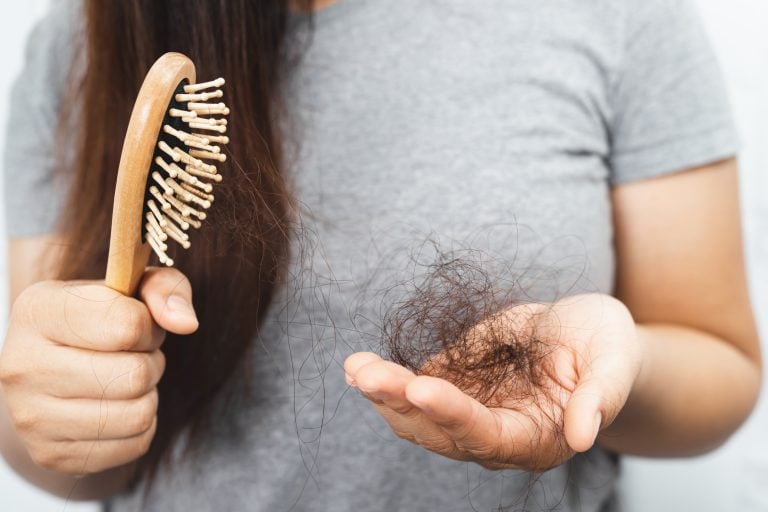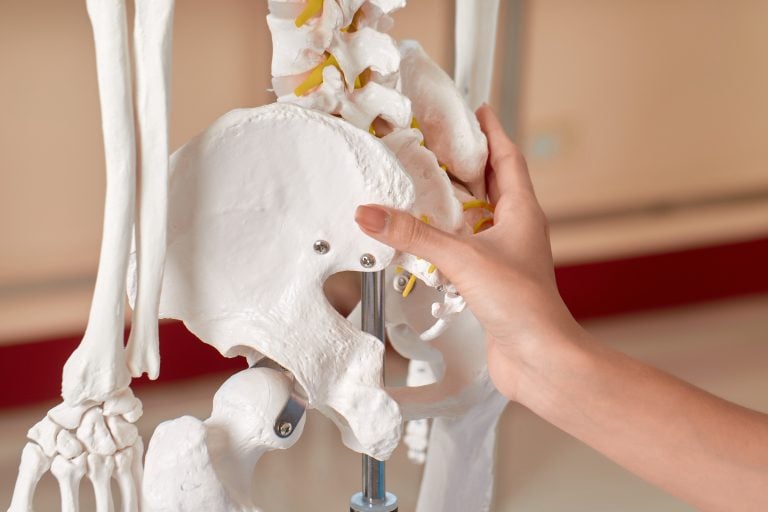Menopause marks the permanent end of menstruation and the close of the reproductive years. Like other major life transitions, including puberty and pregnancy, menopause brings numerous physical and emotional changes. Throughout the three-stage process, which starts with perimenopause and continues through post-menopause, many women experience shifts in mood, metabolism, sleep patterns, and overall quality of life.1Talaulikar V. Menopause transition: physiology and symptoms. Best Pract Res Clin Obstet Gynaecol. 2022;81:3-7. https://doi.org/10.1016/j.bpobgyn.2022.03.003 Although every woman’s experience is unique, these changes can feel overwhelming.
Complementary therapies offer meaningful support during this time. The right balance of diet, exercise, supplements, and social support can help stabilize emotional highs and lows, making the path to menopause more manageable and empowering.
Understanding menopausal mood swings

Natural hormonal fluctuations during the menopausal transition often cause symptoms that affect a woman’s physical, mental, and psychological well-being. For instance, fluctuating estrogen levels in the ovaries alter the production of serotonin, dopamine, and norepinephrine in the brain: three neurotransmitters that regulate mood and behavior. Additionally, personal, psychosocial, and lifestyle factors influence mental health during perimenopause, prompting many women to reexamine their personal identity, social roles, and self-image.1Talaulikar V. Menopause transition: physiology and symptoms. Best Pract Res Clin Obstet Gynaecol. 2022;81:3-7. https://doi.org/10.1016/j.bpobgyn.2022.03.003,2Sujitha Pandian, Yashvanthan, Angeline Grace G. Mental health—an emotional roller coaster around menopause. Nat J Community Med. 2025;16(01). https://doi.org/10.55489/njcm.160120254670,3Kabadayı Demir C, Bayram S, Köse B, Köseler Beyaz E, Yeşil E. Sleep, mood, and nutrition patterns of postmenopausal women diagnosed with major depressive disorder by menopause periods. Life (Basel). 2024;14(6):775. https://doi.org/10.3390/life14060775
“Mood swings often reflect a combination of factors for women,” says Diana Joy Ostroff, ND, DOM, LAc, founder of the Center for Natural Healing Hawaii. “During menopause, women often feel very overwhelmed by the challenges and responsibilities of ordinary life and work, as they don’t have the same drive and desires they once had.”
Specific mood-related changes may include these six symptoms:
- Depression (low mood)
- Emotional distress
- Increased anxiety
- Irritability
- Rage
- Low libido
Declining progesterone and allopregnanolone levels during menopause can also affect the brain. At the same time, the nervous system is potentially restructuring itself to adapt to changing hormone levels, which can affect mood, behavior, memory, and sleep.4Slopien R, Pluchino N, Warenik-Szymankiewicz A, et al. Correlation between allopregnanolone levels and depressive symptoms during late menopausal transition and early postmenopause. Gynecol Endocrinol. 2018;34(2):144-147. https://doi.org/10.1080/09513590.2017.1371129,5Brinton RD, Yao J, Yin F, Mack WJ, Cadenas E. Perimenopause as a neurological transition state. Nat Rev Endocrinol. 2015;11(7):393-405. https://doi.org/10.1038/nrendo.2015.82
“As progesterone declines, sleep is often interrupted, leaving women feeling drained and exhausted,” says Dr. Ostroff. “Attempting to regulate sleep is crucial, as is staying on a regular schedule to balance circadian rhythms.”
Vasomotor symptoms
Vasomotor symptoms, such as hot flashes and night sweats, can disrupt sleep, which in turn may contribute to depressed mood and heightened anxiety.1Talaulikar V. Menopause transition: physiology and symptoms. Best Pract Res Clin Obstet Gynaecol. 2022;81:3-7. https://doi.org/10.1016/j.bpobgyn.2022.03.003 In fact, 35 to 60 percent of menopausal women experience additional sleep disturbances, including insomnia, sleep apnea, and restless leg syndrome.6Jehan S, Masters-Isarilov A, Salifu I, et al. Sleep disorders in postmenopausal women. J Sleep Disord Ther. 2015;4(5):212. https://pubmed.ncbi.nlm.nih.gov/26512337
Sexual dysfunction
Low libido, vaginal dryness, pain during intercourse, and trouble with arousal are common after menopause.1Talaulikar V. Menopause transition: physiology and symptoms. Best Pract Res Clin Obstet Gynaecol. 2022;81:3-7. https://doi.org/10.1016/j.bpobgyn.2022.03.003 These symptoms can deeply impact psychological well-being, especially since many women maintain an interest in sex regardless of age or menopausal status.7Thornton K, Chervenak J, Neal-Perry G. Menopause and sexuality. Endocrinol Metab Clin North Am. 2015;44(3):649-661. https://doi.org/10.1016/j.ecl.2015.05.009
History of depression
A personal history of depression or anxiety increases the likelihood of mood swings during menopause. The Study of Women’s Health Across the Nation identified a history of premenopausal depression as the strongest predictor of mood disturbances in menopause.8Kravitz HM, Colvin AB, Avis NE, Joffe H, Chen Y, Bromberger JT. Risk of high depressive symptoms after the final menstrual period: the Study of Women’s Health Across the Nation (SWAN). Menopause. 2022;29(7):805-815. https://doi.org/10.1097/gme.0000000000001988
The risk of depression may be even higher for women who experience premature menopause. Those entering menopause after age 40 are about half as likely to suffer from severe mood swings.9Georgakis MK, Thomopoulos TP, Diamantaras AA, et al. Association of age at menopause and duration of reproductive period with depression after menopause: a systematic review and meta-analysis. JAMA Psychiatry. 2016;73(2):139-149. https://doi.org/10.1001/jamapsychiatry.2015.2653
Natural remedies for menopausal mood swings

Although hormonal shifts are central to menopausal mood changes, a woman’s mental and emotional well-being is also influenced by biological, psychological, and lifestyle factors.1Talaulikar V. Menopause transition: physiology and symptoms. Best Pract Res Clin Obstet Gynaecol. 2022;81:3-7. https://doi.org/10.1016/j.bpobgyn.2022.03.003 Natural medicine takes a comprehensive approach to easing these effects.
Some of Dr. Ostroff’s top natural remedies are surprisingly simple: regular exercise, fresh air, sunlight, and proper nutrition. She emphasizes plant-rich diets to meet vitamin and mineral needs.
Beyond mood benefits, physical activity supports heart and bone health, minimizes night sweats, and enhances sleep quality. It also lowers the risk of chronic conditions such as metabolic syndrome, cardiovascular disease, and osteoporosis.2Sujitha Pandian, Yashvanthan, Angeline Grace G. Mental health—an emotional roller coaster around menopause. Nat J Community Med. 2025;16(01). https://doi.org/10.55489/njcm.160120254670,10Yue H, Yang Y, Xie F, et al. Effects of physical activity on depressive and anxiety symptoms of women in the menopausal transition and menopause: a comprehensive systematic review and meta-analysis of randomized controlled trials. Int J Behav Nutr Phys Act. 2025;22(1):1-15. https://doi.org/10.1186/s12966-025-01712-z
A strong social support system plays a crucial role in helping many women navigate this transition.2Sujitha Pandian, Yashvanthan, Angeline Grace G. Mental health—an emotional roller coaster around menopause. Nat J Community Med. 2025;16(01). https://doi.org/10.55489/njcm.160120254670
Exercising away anxiety

A systematic review and meta-analysis of 21 studies involving more than 2,000 women found that both low- and moderate-intensity physical activity significantly reduced depressive symptoms during and after menopause. Exercise also alleviated mood-disrupting symptoms, such as sleep disturbances and hot flashes.10Yue H, Yang Y, Xie F, et al. Effects of physical activity on depressive and anxiety symptoms of women in the menopausal transition and menopause: a comprehensive systematic review and meta-analysis of randomized controlled trials. Int J Behav Nutr Phys Act. 2025;22(1):1-15. https://doi.org/10.1186/s12966-025-01712-z
Low-intensity activities like yoga may help reduce anxiety and depression in postmenopausal women.10Yue H, Yang Y, Xie F, et al. Effects of physical activity on depressive and anxiety symptoms of women in the menopausal transition and menopause: a comprehensive systematic review and meta-analysis of randomized controlled trials. Int J Behav Nutr Phys Act. 2025;22(1):1-15. https://doi.org/10.1186/s12966-025-01712-z
Mind–body exercises, including yoga, Pilates, qigong, and tai chi, are effective for relieving anxiety during perimenopause and menopause. Regular aerobic activity further boosts psychological well-being throughout all menopausal stages.11Xu H, Liu J, Li P, Liang Y. Effects of mind-body exercise on perimenopausal and postmenopausal women: a systematic review and meta-analysis. Menopause (New York, NY). 2024;31(5):457-467. https://doi.org/10.1097/GME.0000000000002336,12Trujillo-Muñoz PJ, Sánchez-Ojeda MA, Rodríguez-Huamán EC, Mezyani-Haddu K, Hoyo-Guillot I, Navarro-Prado S. Effects of physical exercise on symptoms and quality of life in women in climacteric: a systematic review and meta-analysis. Healthcare (Basel, Switzerland). 2025;13(6). https://doi.org/10.3390/healthcare13060644 For optimal mood support, a combination of mind–body movement and low-to-moderate intensity exercise may be most beneficial.
Good sleep hygiene
As women age, restful sleep often becomes harder to achieve. Poor sleep can worsen mood, contributing to depression and anxiety.1Talaulikar V. Menopause transition: physiology and symptoms. Best Pract Res Clin Obstet Gynaecol. 2022;81:3-7. https://doi.org/10.1016/j.bpobgyn.2022.03.003
Improving sleep hygiene can help enhance both sleep quality and quantity. Strategies include13Santoro N, Roeca C, Peters BA, Neal-Perry G. The menopause transition: signs, symptoms, and management options. J Clin Endocrinol Metab. 2021;106(1):1-15. https://doi.org/10.1210/clinem/dgaa764:
- Avoiding alcohol, nicotine, caffeine, and spicy foods, especially in the evening
- Using a fan near the bed to ease hot flashes
- Wearing light, breathable sleepwear
- Treating sleep disorders such as obstructive sleep apnea
- Exercising earlier in the day
- Practicing stress-reducing techniques like gentle movement and mindfulness meditation11Xu H, Liu J, Li P, Liang Y. Effects of mind-body exercise on perimenopausal and postmenopausal women: a systematic review and meta-analysis. Menopause (New York, NY). 2024;31(5):457-467. https://doi.org/10.1097/GME.0000000000002336
Anti-inflammatory eating

A Mediterranean-style diet may ease mood-related symptoms of menopause.14Vetrani C, Barrea L, Rispoli R, et al. Mediterranean diet: what are the consequences for menopause? Front Endocrinol. (Lausanne). 2022;13:886824. Published 2022 Apr 25. https://doi.org/10.3389/fendo.2022.886824 Plant-based foods are the staple, with refined carbohydrates, red meat, and heavily processed products eaten less frequently.
Mood-lifting foods can curb feelings of sadness and anxiety14Vetrani C, Barrea L, Rispoli R, et al. Mediterranean diet: what are the consequences for menopause? Front Endocrinol. (Lausanne). 2022;13:886824. Published 2022 Apr 25. https://doi.org/10.3389/fendo.2022.886824,15Zidan S, Hilary S, Al Dhaheri AS, et al. Could psychobiotics and fermented foods improve mood in middle-aged and older women? Maturitas. 2024;181:N.PAG. https://doi.org/10.1016/j.maturitas.2023.107903:
- Nutrient-packed whole fruits, vegetables, grains, nuts, and seeds
- Omega–3-rich oily fish, extra virgin olive oil, flaxseed
- Legumes high in isoflavones (tofu, soybeans, chickpeas, soy milk)
- Probiotics (sauerkraut, kefir, yogurt)
Dietary supplements
Alongside lifestyle changes, some dietary supplements can enhance emotional balance. Dr. Ostroff suggests magnesium glycinate, essential fatty acids, and, in some cases, vitamin and mineral supplements from a naturopathic source.
Methylated B vitamins may also help stabilize mood. “Tyrosine can be added for depression,” Dr. Ostroff adds.
Herbal support
Herbs and nutraceuticals can offer support for mood, sleep, vasomotor symptoms, and sexual health:
- For mood, sleep, and vasomotor symptoms: black cohosh, chasteberry, evening primrose oil, soy isoflavone extracts16Rattanatantikul T, Maiprasert M, Sugkraroek P, Bumrungpert A. Efficacy and safety of nutraceutical on menopausal symptoms in post-menopausal women: a randomized, double-blind, placebo-controlled clinical trial. J Diet Suppl. 2022;19(2):168-183. https://doi.org/10.1080/19390211.2020.1853648
- For overall emotional well-being: Panax ginseng17Lee HW, Choi J, Lee Y, Kil KJ, Lee MS. Ginseng for managing menopausal women’s health: a systematic review of double-blind, randomized, placebo-controlled trials. Medicine (Baltimore). 2016;95(38):e4914. https://doi.org/10.1097/MD.0000000000004914,18Kargozar R, Azizi H, Salari R. A review of effective herbal medicines in controlling menopausal symptoms. Electron Physician. 2017;9(11):5826-5833. https://doi.org/10.19082/5826
- For hot flashes and better sleep: Salvia officinalis (sage), Melissa officinalis (lemon balm)18Kargozar R, Azizi H, Salari R. A review of effective herbal medicines in controlling menopausal symptoms. Electron Physician. 2017;9(11):5826-5833. https://doi.org/10.19082/5826
- For libido and vaginal dryness: Hypericum perforatum (St. John’s wort)18Kargozar R, Azizi H, Salari R. A review of effective herbal medicines in controlling menopausal symptoms. Electron Physician. 2017;9(11):5826-5833. https://doi.org/10.19082/5826
Dr. Ostroff often recommends Hypericum perforatum for depression. For anxiety, she suggests these calming herbs:
- Scutellaria (skullcap)
- Avena sativa (oatstraw)
- Passiflora incarnata (passionflower)
- Lavandula angustifolia (lavender)
Hormone replacement therapy
Hormone replacement therapy (HRT), with estrogen, progesterone, or both, is a widely used treatment for menopause symptoms like low mood, sleep disturbances, and sexual dysfunction.2Sujitha Pandian, Yashvanthan, Angeline Grace G. Mental health—an emotional roller coaster around menopause. Nat J Community Med. 2025;16(01). https://doi.org/10.55489/njcm.160120254670,6Jehan S, Masters-Isarilov A, Salifu I, et al. Sleep disorders in postmenopausal women. J Sleep Disord Ther. 2015;4(5):212. https://pubmed.ncbi.nlm.nih.gov/26512337,13Santoro N, Roeca C, Peters BA, Neal-Perry G. The menopause transition: signs, symptoms, and management options. J Clin Endocrinol Metab. 2021;106(1):1-15. https://doi.org/10.1210/clinem/dgaa764
Progesterone therapy can be especially beneficial for sleep troubles. “Bioidentical progesterone or Dioscorea villosa (wild yam) often helps these women,” says Dr. Ostroff.
For symptoms related to estrogen deficiency, she recommends bioidentical estradiol combined with estriol. Cimicifuga racemosa (black cohosh) may serve as a natural alternative to estrogen therapy.
Before beginning HRT, it’s important to consult a qualified healthcare provider. “It’s always best to have hormones tested thoroughly before prescribing,” Dr. Ostroff advises.
Medical interventions & cognitive behavioral therapy
Additional options for managing menopausal symptoms include cognitive behavioral therapy and antidepressant medications, such as selective serotonin reuptake inhibitors (SSRIs) or serotonin-norepinephrine reuptake inhibitors.2Sujitha Pandian, Yashvanthan, Angeline Grace G. Mental health—an emotional roller coaster around menopause. Nat J Community Med. 2025;16(01). https://doi.org/10.55489/njcm.160120254670
However, be cautious: prescription antidepressants should not be combined with St. John’s wort, Panax ginseng, or other herbs that influence serotonin levels.
Footnotes
- 1Talaulikar V. Menopause transition: physiology and symptoms. Best Pract Res Clin Obstet Gynaecol. 2022;81:3-7. https://doi.org/10.1016/j.bpobgyn.2022.03.003
- 2Sujitha Pandian, Yashvanthan, Angeline Grace G. Mental health—an emotional roller coaster around menopause. Nat J Community Med. 2025;16(01). https://doi.org/10.55489/njcm.160120254670
- 3Kabadayı Demir C, Bayram S, Köse B, Köseler Beyaz E, Yeşil E. Sleep, mood, and nutrition patterns of postmenopausal women diagnosed with major depressive disorder by menopause periods. Life (Basel). 2024;14(6):775. https://doi.org/10.3390/life14060775
- 4Slopien R, Pluchino N, Warenik-Szymankiewicz A, et al. Correlation between allopregnanolone levels and depressive symptoms during late menopausal transition and early postmenopause. Gynecol Endocrinol. 2018;34(2):144-147. https://doi.org/10.1080/09513590.2017.1371129
- 5Brinton RD, Yao J, Yin F, Mack WJ, Cadenas E. Perimenopause as a neurological transition state. Nat Rev Endocrinol. 2015;11(7):393-405. https://doi.org/10.1038/nrendo.2015.82
- 6Jehan S, Masters-Isarilov A, Salifu I, et al. Sleep disorders in postmenopausal women. J Sleep Disord Ther. 2015;4(5):212. https://pubmed.ncbi.nlm.nih.gov/26512337
- 7Thornton K, Chervenak J, Neal-Perry G. Menopause and sexuality. Endocrinol Metab Clin North Am. 2015;44(3):649-661. https://doi.org/10.1016/j.ecl.2015.05.009
- 8Kravitz HM, Colvin AB, Avis NE, Joffe H, Chen Y, Bromberger JT. Risk of high depressive symptoms after the final menstrual period: the Study of Women’s Health Across the Nation (SWAN). Menopause. 2022;29(7):805-815. https://doi.org/10.1097/gme.0000000000001988
- 9Georgakis MK, Thomopoulos TP, Diamantaras AA, et al. Association of age at menopause and duration of reproductive period with depression after menopause: a systematic review and meta-analysis. JAMA Psychiatry. 2016;73(2):139-149. https://doi.org/10.1001/jamapsychiatry.2015.2653
- 10Yue H, Yang Y, Xie F, et al. Effects of physical activity on depressive and anxiety symptoms of women in the menopausal transition and menopause: a comprehensive systematic review and meta-analysis of randomized controlled trials. Int J Behav Nutr Phys Act. 2025;22(1):1-15. https://doi.org/10.1186/s12966-025-01712-z
- 11Xu H, Liu J, Li P, Liang Y. Effects of mind-body exercise on perimenopausal and postmenopausal women: a systematic review and meta-analysis. Menopause (New York, NY). 2024;31(5):457-467. https://doi.org/10.1097/GME.0000000000002336
- 12Trujillo-Muñoz PJ, Sánchez-Ojeda MA, Rodríguez-Huamán EC, Mezyani-Haddu K, Hoyo-Guillot I, Navarro-Prado S. Effects of physical exercise on symptoms and quality of life in women in climacteric: a systematic review and meta-analysis. Healthcare (Basel, Switzerland). 2025;13(6). https://doi.org/10.3390/healthcare13060644
- 13Santoro N, Roeca C, Peters BA, Neal-Perry G. The menopause transition: signs, symptoms, and management options. J Clin Endocrinol Metab. 2021;106(1):1-15. https://doi.org/10.1210/clinem/dgaa764
- 14Vetrani C, Barrea L, Rispoli R, et al. Mediterranean diet: what are the consequences for menopause? Front Endocrinol. (Lausanne). 2022;13:886824. Published 2022 Apr 25. https://doi.org/10.3389/fendo.2022.886824
- 15Zidan S, Hilary S, Al Dhaheri AS, et al. Could psychobiotics and fermented foods improve mood in middle-aged and older women? Maturitas. 2024;181:N.PAG. https://doi.org/10.1016/j.maturitas.2023.107903
- 16Rattanatantikul T, Maiprasert M, Sugkraroek P, Bumrungpert A. Efficacy and safety of nutraceutical on menopausal symptoms in post-menopausal women: a randomized, double-blind, placebo-controlled clinical trial. J Diet Suppl. 2022;19(2):168-183. https://doi.org/10.1080/19390211.2020.1853648
- 17Lee HW, Choi J, Lee Y, Kil KJ, Lee MS. Ginseng for managing menopausal women’s health: a systematic review of double-blind, randomized, placebo-controlled trials. Medicine (Baltimore). 2016;95(38):e4914. https://doi.org/10.1097/MD.0000000000004914
- 18Kargozar R, Azizi H, Salari R. A review of effective herbal medicines in controlling menopausal symptoms. Electron Physician. 2017;9(11):5826-5833. https://doi.org/10.19082/5826





